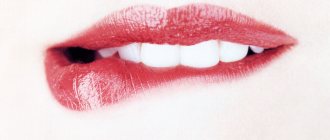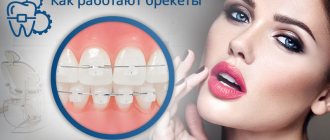Chewing or grinding of teeth in a child
Chewing or smacking in sleep is an uncontrolled contraction of the oral masticatory muscles, accompanied by a sharp clenching of the jaws, grinding of teeth, smacking, excessive salivation, creaking and other symptoms. In medicine, this problem is called “bruxism.”
The period of time during which a person chews can range from a few seconds to 5-10 minutes. Typically, during the entire sleep phase, several episodes of pathology can be noticed. If one episode lasts more than 15 seconds, cracks and chips in the teeth and soft tissue injuries may occur.
Experts have linked a variety of slurping sounds, chewing, and teeth grinding to other sleep disorders. They accompany somnambulism, snoring, urinary incontinence at night, and the occurrence of nightmares. The popular version attributes the symptoms of bruxism to infection with worms. However, in reality, night sounds of teeth and the presence of parasites in the body are in no way connected.
Most often, manifestations of bruxism, when a person periodically swallows saliva, grinds teeth, smacks or chews, are associated with psycho-emotional disorders, for example, depression, stress, mental overload. Excessively active activities before bedtime, overexcitation, growing internal anxiety, and general tension provoke restless sleep.
If the episodes last no more than 10 seconds and occur 1-2 times per night, then this may not indicate any disease, but simply be an individual feature.
This is especially true for young children, who are often subject to reflexes, and chewing at night is a kind of continuation of the sucking instinct or may indicate the child’s hunger.
How long should a baby sleep?
The importance of sleep for babies is difficult to overestimate.
Quality rest, as well as good nutrition, is the key to normal physical and psycho-emotional health of children. During sleep:
- the hormone somatotropin is produced, which plays an important role in the formation of the skeleton;
- Immunity is restored. After falling asleep, T-lymphocytes are activated, destroying viruses and bacteria;
- metabolism in tissues increases;
- cells are renewed;
- the nervous system relaxes.
Babies spend most of their time sleeping during the first three months of life. According to WHO recommendations, the total sleep duration of babies from 0 to 3 months should be 14–17 hours a day. However, these indicators are approximate, because each child is individual. Therefore, if your baby sleeps more or less than the established norm, but still feels good, then there is no need to worry.
Reasons for chewing in your sleep
A person chews in his sleep for several reasons:
- Features of the psyche of young children. Children handle emotional stress and stress differently. Even some positive emotions, but excessive ones, can manifest themselves as nighttime symptoms of bruxism. In this case, the child should be shown to a neurologist to exclude possible pathologies of the central nervous system.
- Teething or changing milk teeth to molars . This process is often accompanied by discomfort, pain, and itching. A sleeping baby literally wants to scratch his gums, but does not control himself in his sleep, so he chews or grinds his teeth.
- Various orthodontic pathologies - malocclusion, diseases of the jaw joints, abnormal structure - can lead to the fact that the baby seems to chew food not only in his sleep, but also during daylight hours.
- Another reason why people suffer from bruxism is heredity . The risk of its manifestation in children increases if a similar pathology is observed in one of the parents.
- Nightmarish dreams. Too much stress during a night's rest can cause unconscious movements of various muscles, which is manifested not only by grinding, but also by moving the tongue in sleep, twitching of the arms and legs, blinking, and tics.
- Nasal congestion , enlarged adenoids and other disturbances in normal breathing cause anxiety and overly active work of the facial muscles.
- Manifestations of bruxism are accompanied by a deficiency of magnesium, calcium, amino acids and B vitamins, which affect the functioning of the central nervous system and muscles.
- Insufficient development of jaw muscles . A newborn baby must be fed only with milk or formula, and from 6 months it is necessary to introduce complementary foods, constantly changing the structure of dishes. If a child primarily eats pureed or blended food, the jaw muscles do not work. If there is no load, grinding or chewing may occur during sleep.
In the presence of helminths, it is indeed possible that such a symptom may occur, but it is not caused by the presence of parasites as such, but by general discomfort in the body, intoxication, which makes sleep restless and intermittent.
Diagnostics
Most children who have this problem during night or daytime sleep do not even know about it. Therefore, most often, parents diagnose the problem.
Some signs:
- Teeth grinding when your baby sleeps;
- Complaints of pain in the face or jaw after waking up in the morning;
- Pain when chewing.
If you experience any of these signs, contact your dentist to examine your mouth for wear and damage. Spray air and water on teeth to test sensitivity.
If damage is found, the dentist may ask your child several questions, such as:
- How do you feel before bed?
- Are you worried about anything at home or at school?
- Are you angry with someone?
- What do you do before bed?
The exam will help the dentist understand whether the cause is anatomical (misaligned teeth) or psychological (stress). Select an effective treatment plan.
Treatment
Smacking in your sleep is not considered a pathology and does not threaten your health. Rather, this problem is not the sleeper himself, but his environment. There are several secrets that will help solve the problem of teeth movement and grinding:
- Try to organize your child’s activities in such a way that he does not experience too strong emotions, including positive ones. Protect him from stress, family quarrels, too active evening games, cartoons and computer games with a scary plot.
- If a child slurps regularly and often (more than 5-7 episodes per night), show him to specialists - a pediatrician, neurologist, somnologist. The cause of night grinding in adolescents may be vegetative-vascular disorders, which are accompanied by headaches and fluctuations in blood pressure.
- It is also necessary to exclude the viral load on the body and check for worms. If, in addition to manifestations of bruxism, the child is pale, inactive, has a disturbance in appetite and bowel movements, basic tests - urine and blood - will be required.
- Sometimes children chew because of an uncomfortable bed, scratchy bedding, stale dry air, or high temperature in the bedroom. Be sure to ventilate before going to bed, adjust the humidity to 50–70%.
- You can come up with evening rituals that will help your baby calm down faster. Swimming, listening to audio books, fairy tales, and some calm games, such as board games, are suitable.
If such symptoms are caused by a pathological condition or some disease, medications are selected only by a doctor. If a pathology is diagnosed, treatment will not be aimed at eliminating grinding or chewing, but at the root cause.
Helping children with bruxism
Whether the cause is physical or psychological, children can control bruxism by relaxing before bed—for example, taking a warm bath or shower, listening to soothing music for a few minutes, or reading a book. For infants who are teething, you can offer them a pacifier. She will calm the baby and give a light massage to the gums.
If you are teething or have an ear infection, ask your doctor to prescribe the correct dose of ibuprofen to relieve discomfort.
If teeth grinding is caused by stress, ask about what is upsetting your baby and find solutions.
In rare cases, when stressful situations cannot be resolved within the family circle and sleep problems arise, the help of a psychologist is required. He will help you find the cause of stress and prescribe the right course of treatment.
How to avoid the disorder - prevention of bruxism in children
Remember that most often, involuntary closing of the jaws during sleep is observed against the background of stressful situations. Try to ensure that the baby grows up in a comfortable psychological and emotional environment.
In cases where stress could not be avoided (this could be entering kindergarten, forced separation from one of the parents, the death of a grandmother or grandfather), try to mitigate its consequences as much as possible. Be especially attentive and tolerant of your child during such periods.
To prevent nighttime bruxism, make sure your child is calm before bedtime. Instead of watching cartoons or a computer game, invite him to read, or do puzzles or mosaics. Stop active games at least an hour before bedtime. Try to spend at least half an hour before bed with your child, this will allow him to relax and fall asleep peacefully. Quiet walks in the fresh air are also very useful in the evening. They not only help create a favorable emotional background, but also contribute to the health of the body as a whole.
Monitor your child's nutrition. Try to keep his food healthy and varied. Be sure to keep your jaws busy by letting your baby chew on hard vegetables and fruits. This kind of “charging” is especially useful an hour before going to bed, just don’t forget that after it the child should brush his teeth. Select the brush and toothpaste according to the baby’s age. If the child is still very young, ASEPTA Baby gel toothpaste, designed specifically for delicate baby teeth, is perfect. And for those who are already 4 years old, we can recommend ASEPTA Kids toothpaste. It helps to carefully care for the oral cavity during the period of growth of baby teeth and their replacement with permanent ones, ensuring oral health.
There is no need to panic if your child begins to grind his teeth in his sleep, but carefully assess the degree of the disorder and the possible threat to the baby’s health, visiting specialists if necessary. Timely medical consultation will help avoid worsening the problem and the development of more serious ailments.
Diagnosis and treatment of bruxism in children
The fact that a child suffers from teeth grinding is noticed by the parents themselves or close relatives. But to confirm the diagnosis, a special polysomnographic study is required. It allows you to record the presence of involuntary contractions of the masticatory muscles and is important for excluding epilepsy, as one of the possible hidden causes of the disorder.
A dentist can also determine the presence of burxism. To do this, an examination of the oral cavity is carried out, and if necessary, a bruxchecker is used - a special mouth guard, selected individually. It is inserted into the mouth while you sleep at night, after which it is given to the dentist for examination. Based on the nature of the damage to the mouth guard, it determines the places where the teeth are subjected to the greatest load during sleep.
Since it is extremely difficult to accurately determine the cause of the disorder, an integrated approach to its treatment is most effective.
Let's talk in more detail about the methods of treating bruxism in children, used by specialists in various branches of medicine:
- psychotherapeutic – meditation, auto-training, relaxation training, reducing stress levels, mastering self-control techniques, etc.;
- dental – consultations with specialized specialists (periodontist, orthodontist), correction of bite defects and correct selection of braces, timely replacement of deformed fillings;
- medications - taking calcium, magnesium, B vitamins, sedatives and hypnotics, Botox injections and other medications that help reduce the activity of the masticatory muscles;
- physiotherapeutic: relaxing massage, facial gymnastics, compresses.
For those who are trying to decide for themselves the question of how to treat bruxism in children, the following measures can also be recommended:
- wearing protective overlays on the teeth (mouthguards), which prevent the contact of the upper and lower teeth in the event of involuntary closure of the jaws during sleep;
- additional load on the jaws before bedtime: invite the child to chew an apple or carrot an hour before bedtime; sometimes chewing gum is also used for this;
- warm compresses on the cheekbones for 10-15 minutes twice a day to help relieve pain;
- self-control - teach your child to ensure that when the mouth is closed, the upper and lower teeth do not touch.
If you observe frequent and prolonged bouts of bruxism in your child, be sure to consult a doctor. Among the serious consequences of this disorder, doctors identify damage and premature loss of teeth, hearing impairment, and the appearance of asymmetry in the face. Don't wait for them to appear.
Help with panic attacks
A person suffering from panic attacks at night cannot correctly assess his condition. Often waking up with a feeling of fear and anxiety is perceived as an ordinary nightmare, so they are in no hurry to seek help. But such episodes are becoming more frequent, and my health is getting worse. If panic attacks occur during sleep, treatment should only be prescribed by a psychiatrist or psychotherapist. At the initial consultation, the doctor collects an anamnesis. Only sincere answers and a confidential conversation with a doctor will help you make a correct diagnosis and choose the optimal therapy. The main goal of conversations with a doctor is to learn to quickly recognize your panic attack and, over time, learn to cope with it, learn to help yourself, gain personal experience of successfully overcoming, coping, and thereby minimize the risk of its reoccurrence.
For a sleep panic attack, symptoms and treatment vary. With a high level of anxiety, as well as with severe or frequent attacks, a course of anti-anxiety (anxiolytic) drugs has a good effect. Medicines are selected individually, and only with the consent of the patient.
If a panic attack occurs in a dream, how to deal with it without pills?
At the onset of the disease, relaxation and muscle relaxation techniques help to quickly calm down and normalize the nervous system. This is taught in psychotherapy sessions. Breathing techniques, therapeutic hypnosis, and cognitive behavioral psychotherapy are also effectively used.
Individual and then group psychotherapy is an important stage in the treatment of panic attacks. A person needs to figure it out and understand what makes up his individual causes of anxiety attacks during the daytime. Learn to respond adequately to various stressful situations. Find your own individual regimen that makes up a healthy lifestyle, strictly follow the recommendations of your doctor. Only in this case will the prognosis be favorable.
Why is night bruxism dangerous?
Should parents worry and take some measures if their baby grinds his teeth in his sleep? Yes, if:
- Child's age over 7 years
Most often, teeth grinding during sleep occurs in young children, and by the age of seven it usually goes away without a trace. If the child has already gone to school, but the problem remains, it’s time to take measures to eliminate it.
- A large number of repetitions of this condition are recorded or attacks last more than 15 seconds
In these cases, unpleasant sounds made by teeth during sleep may indicate serious disorders in the activity of the nervous system. The sooner the diagnosis is made and treatment is prescribed, the greater the chance of avoiding the disease becoming chronic.
- There are signs of tooth decay or gum inflammation
If you do not take action in a timely manner, you may face much more serious problems: gum disease, premature loss of baby teeth, and malocclusion.
Bruxism becomes especially dangerous when baby teeth are replaced by permanent teeth. It can cause diseases that will lead to the loss of permanent teeth at an early age.
Doctors do not consider bruxism a health-threatening disorder, especially if we are talking specifically about nighttime teeth grinding. It usually goes away with age without any treatment.
If you want to help your baby cope with the problem before he outgrows it, then first consult a dentist.
What about worms?
There is a common belief that teeth grinding may be a sign of a parasitic disease. This is due to the fact that preschool children often suffer from helminths. And it is precisely at this age that teeth grinding is typical. Also, this assumption was explained by the fact that when infected with helminths, salivation increases. This provokes clenching of the jaws, which leads to teeth grinding. But according to specialist research, this is just a coincidence. A direct connection between the presence of worms in a child and bruxism has not been identified.
Physical discomfort
The first and most common reason why a child does not sleep well at night is uncomfortable sleeping conditions: hot or cold, dry or too damp air, “scratchy” synthetic bedding or uncomfortable pajamas, a heavy blanket, a crumpled lumpy bed, a wet or dirty diaper.
How to proceed:
- create a healthy microclimate in the sleeping room - with a temperature of 18-20 ºС and a humidity of 50-70%;
- choose cozy cotton pajamas according to the season - warm or light;
- make and carefully straighten bedding made of natural material before going to bed;
- if necessary, change the mattress, blanket or pillow to a more comfortable one, preferably made from hypoallergenic materials;
- Use high-quality diapers and change them promptly.
The second reason in this group is pain of various origins. This may include colic or painful teething in infants, aching muscles and joints during rapid growth in older children. Infants cannot talk about their sensations, other children complain of pain, but sometimes it is quite difficult to “calculate” its cause and clear localization.
How to proceed:
- if a baby has colic, the nursing mother should reconsider her diet and select a suitable formula for the artificial one;
- massage itchy gums when teething with a chilled teether or a finger wrapped in gauze; if necessary, apply an anesthetic gel;
- Relaxing baths and light massages at night help to cope with muscle pain in children;
- Pain of unknown origin requires consultation with a pediatrician.
The third reason is childhood illnesses, especially with high fever. Often, sleep disturbances indicate the onset of the disease. Some children literally “fall asleep,” while others cannot fall asleep, rush around, worry, and constantly wake up.
How to proceed:
- go to the doctor;
- During treatment, alleviate the child’s condition in every possible way: give an antipyretic when the temperature rises above 380C, provide clean, fresh and moist air in the room and rest for the baby.
The fourth reason is thirst, hunger or excessive heaviness in the stomach.
How to proceed:
- Children under one year old can “legally” wake up for night feedings; denser feedings at night and maintaining a comfortable microclimate in the room help reduce their number - this way the baby will not wake up from thirst. The latter is important for any child;
- For older children, offer a light but quite filling dinner without invigorating drinks - cola, strong tea, cocoa;
- Follow your meal schedule.
The fifth reason why a child sleeps poorly at night is allergies, digestive and metabolic disorders. Most often, this is an allergic reaction to salicylates, an upset stomach after eating unusual or stale foods for dinner, or manifestations of a lack of calcium in the child’s body.
How to proceed:
- carefully analyze your child’s diet and remove everything that causes a negative reaction;
- as an experiment, temporarily exclude salicylates - food additives with tartrazine E 102, citrus fruits, tomatoes;
- to check whether the child receives enough calcium, you can give it to the child in tablets in a prophylactic dose - this often improves sleep and is especially important if the baby receives a lot of vitamin D, which requires a combination with calcium.
How to help a child?
It is worth understanding that these habits do not arise on their own and not because of bad behavior. Comments and reminders that you should not stick your tongue out will not work - you need to work with the root cause of the disorder.
- Restore nasal breathing.
Orthodontists often prescribe consultations with an otolaryngologist, since the dental system and respiratory organs are closely connected. Removal of adenoids, treatment of chronic diseases, normalization of the microclimate at home to reduce the frequency of acute respiratory viral infections, hardening and other restorative procedures - all this can be prescribed by a doctor to achieve remission.
ENT can help restore health for proper tongue function
- Contact an orthodontist.
Only in this order, otherwise the treatment will not be effective. As soon as the child is able to breathe with his mouth closed, you can move on to correcting the position of the teeth and tongue.
For this purpose, children's orthodontic devices have been created:
- Plates.
- Trainers.
- Twin Block device.
- Children's aligners Kinder Smile.
All these devices are removable and act quite gently, guiding teeth during the period of their active growth. Wearing requires parental supervision, but with proper use, problems are solved quite quickly - within a few months.
Only after this can you begin classes with a speech therapist - when the malocclusion and the main manifestations of tongue dysfunction are eliminated, the correction of sound pronunciation will be much more successful.











